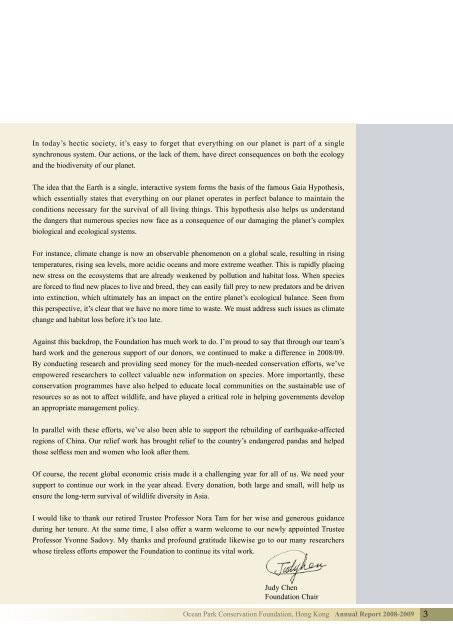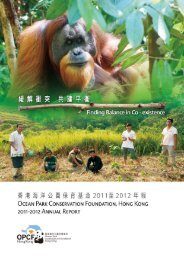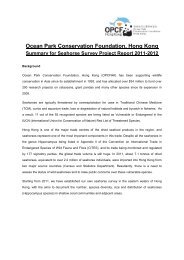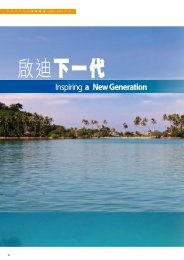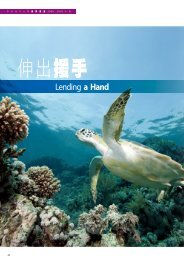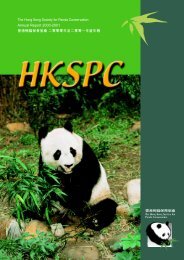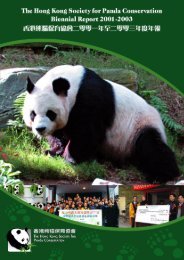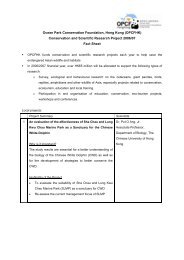ä¿¡ææ天 - é¦æ¸¯æµ·æ´å ¬åä¿è²åºé
ä¿¡ææ天 - é¦æ¸¯æµ·æ´å ¬åä¿è²åºé
ä¿¡ææ天 - é¦æ¸¯æµ·æ´å ¬åä¿è²åºé
You also want an ePaper? Increase the reach of your titles
YUMPU automatically turns print PDFs into web optimized ePapers that Google loves.
In today’s hectic society, it’s easy to forget that everything on our planet is part of a single<br />
synchronous system. Our actions, or the lack of them, have direct consequences on both the ecology<br />
and the biodiversity of our planet.<br />
The idea that the Earth is a single, interactive system forms the basis of the famous Gaia Hypothesis,<br />
which essentially states that everything on our planet operates in perfect balance to maintain the<br />
conditions necessary for the survival of all living things. This hypothesis also helps us understand<br />
the dangers that numerous species now face as a consequence of our damaging the planet’s complex<br />
biological and ecological systems.<br />
For instance, climate change is now an observable phenomenon on a global scale, resulting in rising<br />
temperatures, rising sea levels, more acidic oceans and more extreme weather. This is rapidly placing<br />
new stress on the ecosystems that are already weakened by pollution and habitat loss. When species<br />
are forced to find new places to live and breed, they can easily fall prey to new predators and be driven<br />
into extinction, which ultimately has an impact on the entire planet’s ecological balance. Seen from<br />
this perspective, it’s clear that we have no more time to waste. We must address such issues as climate<br />
change and habitat loss before it’s too late.<br />
Against this backdrop, the Foundation has much work to do. I’m proud to say that through our team’s<br />
hard work and the generous support of our donors, we continued to make a difference in 2008/09.<br />
By conducting research and providing seed money for the much-needed conservation efforts, we’ve<br />
empowered researchers to collect valuable new information on species. More importantly, these<br />
conservation programmes have also helped to educate local communities on the sustainable use of<br />
resources so as not to affect wildlife, and have played a critical role in helping governments develop<br />
an appropriate management policy.<br />
In parallel with these efforts, we’ve also been able to support the rebuilding of earthquake-affected<br />
regions of China. Our relief work has brought relief to the country’s endangered pandas and helped<br />
those selfless men and women who look after them.<br />
Of course, the recent global economic crisis made it a challenging year for all of us. We need your<br />
support to continue our work in the year ahead. Every donation, both large and small, will help us<br />
ensure the long-term survival of wildlife diversity in Asia.<br />
I would like to thank our retired Trustee Professor Nora Tam for her wise and generous guidance<br />
during her tenure. At the same time, I also offer a warm welcome to our newly appointed Trustee<br />
Professor Yvonne Sadovy. My thanks and profound gratitude likewise go to our many researchers<br />
whose tireless efforts empower the Foundation to continue its vital work.<br />
Judy Chen<br />
Foundation Chair<br />
Ocean Park Conservation Foundation, Hong Kong Annual Report 2008-2009 3


